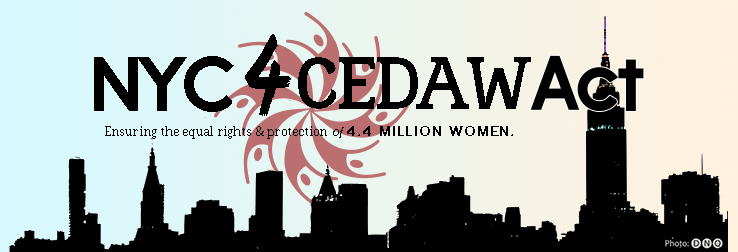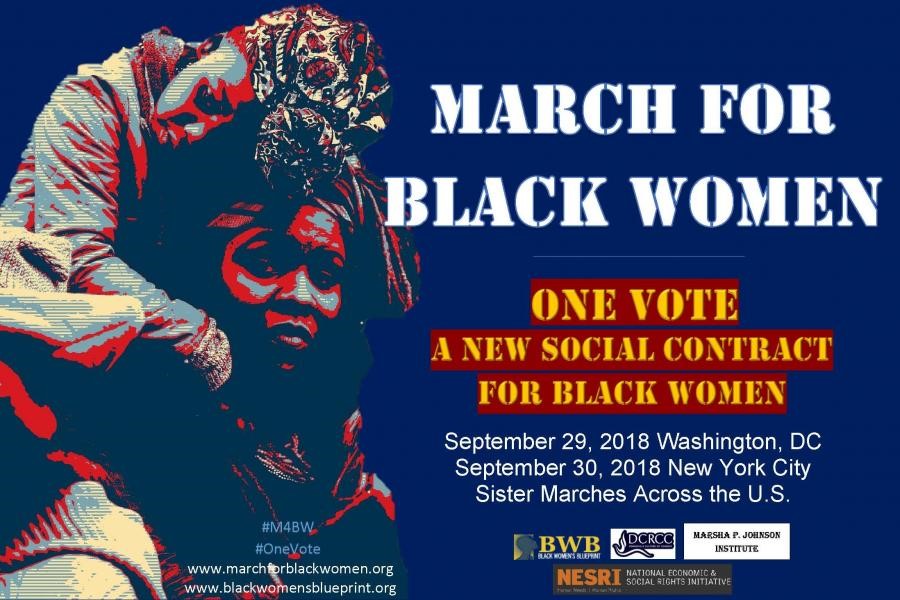Statement about the March for Black Women
Black Women’s Blueprint
DC Rape Crisis Center
Marsha P. Johnson Institute
National Economic & Social Rights Initiative (NESRI)
We are Black women and we have yet to be heard. On September 29, 2018 Black women in all their diversity will converge on Washington, DC and on September 30, 2018 rally in New York because we will not be silenced, nor will we be kept out of sight and out of the minds of so-called political and community leaders.
The upcoming 2018 March and Rally for Black Women is a continued call to action to those on the brink of political fatigue, exasperated with distractions and the lack of adequate political will and response for securing the basic rights for which Black women have been fighting. This March is for those tired of asking for a seat at the table and ready to create their own table. It is for those who continue to muster the imagination to conceive of a new reality given the unconscionable realities most of us have had to come to grips with. As some turn inward, the March for Black Women is for those seeking a way outward toward the formation of a new social contract toward a realignment and a fundamental reshaping of our political institutions, to rein in the power of private wealth, decentralized faceless bureaucracies, reorient our institutions around shared values and restore community control over the decisions that are most important to people’s lives.
We have work to do to create a just and sustainable future. To all those still seeking social transformation, beyond our resistance, we say rise and persist with one vote this Fall and drive home the message that our everyday lives are political.
So long as Black women continue to be forcibly taken from their children, our lives are political. So long as we are deported or killed by law enforcement, our lives are political. So long as our daughters continue to be sold or go missing; so long as trans-identified women continue to be murdered and the rest relentlessly raped by friends, family, dates, strangers, prominent persons or nationally renown predators, our lives are and will remain political. We must continue to deploy our collective power to demand justice and fight for peace. As the Violence Against Women Act is set to expire September 30, 2018, we don’t want anymore debates. Black women rise and cast #onevote for meaningful policies to end gender violence. Cast #onevote to end the persistent feminization of poverty, the growing Black female prison population. Cast #onevote to end restrictions to citizenship and the deportation of Black and Brown people. #Onevote to eliminate the threat to health care and reproductive justice.
Black women are a powerful voting block and have been instrumental at the polls. This coming election is no different. We march to the 2018 midterm election imbued with full recognition of our civil and political rights. Candidates cannot keep pocketing and back-seating Black women’s realities! What costs might we face if we go into this next election phase ignoring or riding out the persistent historical amnesia about how Black women live and how we vote in this country?
This September 29th and 30th Black women, cis, trans, and diverse identities, allies and comrades will unite and lock arms, marching unapologetically with all others who want to pull the foot of oppression off our necks and foreground the notion a new social contract is needed for all Black women, a new social contract that overturn to the dominant political narratives of the past, and courageous enough in the present to pass along to our future generations.
Our demands:
- Full reauthorization of the Violence Against Women Act set to expire on September 30, 2018.
- Our political hopefuls focus on intersectional women’s rights concerns like poverty, affordable housing, reproductive rights, immigration protections and center the most vulnerable.
- Remove the gag order on advocacy and prevention focused agencies forbidding the use of the words: transgender, fetus, vulnerable, science-based, evidence-based, diversity, and entitlement.
Because of who we are and have been to the making of this nation and communities within it, place our lives as central to contemporary political agendas.


Comments
Statement about the March for Black Women — No Comments